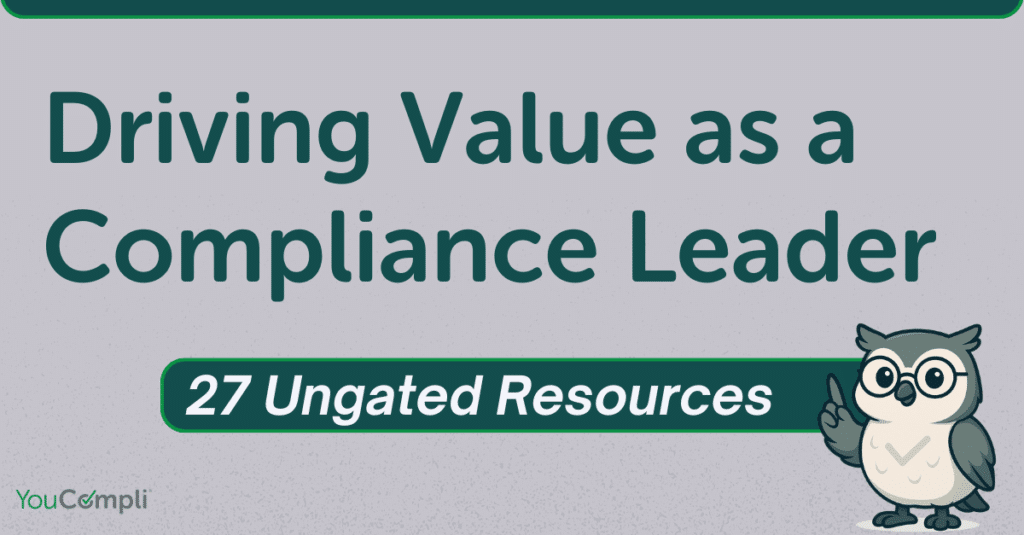
Five power influence skills for healthcare regulatory compliance leaders
By Sharon Parsley
Sharon Parsley, JD, MBA, CHC, CHRC, is a health law attorney, compliance officer, author, speaker, investigator, and problem solver. She currently serves as the president and managing director of Quest Advisory Group, LLC. She has nearly 20 years of healthcare compliance and legal leadership experience, and she believes that mentorship and on-the-job training are critical to compliance professional success. This is the first article in her monthly series on compliance officer effectiveness for the YouCompli blog.
Over the past 25 years, we have pioneered the field of healthcare compliance – which means we developed wisdom through years of trial and error. We had a front row seat as the government introduced the seven elements of an effective compliance program. Some of our colleagues and friends were founding members of HCCA. We created the artful blend of law, medicine, policy, and training that makes up the compliance function. We discovered which levers to pull to bring our colleagues along. We discovered a balance of systems, processes, and influence necessary to effectively manage regulatory changes for our organizations.
And we found that, despite all the processes and checklists we created, soft skills matter a lot. If the person responsible for the implementation and management of the compliance program lacks critical skills for success, that compliance program will not, likely, achieve optimal results. It takes effort to develop the mix of skills, experience, and talent to build a long and successful career in the healthcare compliance field. Our technical, clinical, and legal skills provide important context for our work, but they aren’t enough.
The transition to compliance leadership requires a new layer of learning. New compliance professionals need training and support to blend technical know-how and skills for influence to achieve ultimate effectiveness. A critical component of effectiveness is teaching and practicing the skills for influence that up-and-coming leaders need to do their very best work.
The technical skills required of a compliance officer
Compliance officers must be able to effectively manage regulatory change and understand the elements of a compliance program. They must also have a solid grasp of the body of regulatory and sub-regulatory guidance that applies to his/her enterprise. It is a significant task for every compliance officer to stay abreast of changes in regulations at all levels and understand how they apply to their organization.
Further, compliance officers serve these functions:
- Risk assurance for all clinical service lines of the enterprise. They must know enough to be a credible resource for operational leaders and frontline employees when a compliance issue or opportunity comes up.
- Advisor to senior leadership on the compliance issues which may arise as a result of entering into new clinical service areas and geographic markets.
- Technology and electronic health record advisor. These systems can yield important visibility and insight into new and emerging areas of risk if we understand how to create, change, interpret, and use data analytics and reports.
- Consultant on enterprise policies and procedures. It is common to have department and business-unit standard operating procedures and policies; facility-level policies; and system-level policies. Compliance officers help smooth out conflicts and inconsistencies.
Healthcare compliance professionals need power skills for influence
These technical skills demand a level of professionalism, presence, and influence to be effectively deployed. In this series I’ll explore the “soft skills” I’ve seen in the most effective compliance officers in healthcare. I’ll talk about how we cultivate these skills in ourselves and in new compliance professionals.
Here’s a preview of skills I’ll explore:
- Written and oral communication skills that serve to secure buy-in and support from senior leadership. We often make recommendations that could be perceived as having negative operational or monetary impact. Being able to meaningfully articulate the “why” behind those recommendations in clear, benefits-driven terms is imperative. Compliance officers also draft audit and investigative reports, create and maintain policies, create meeting agendas and periodic reports for executive teams and board committees, making solid writing skills a necessity.
- Interpersonal relationships with board members, senior executives, operational directors, managers, and supervisors, licensed providers, non-licensed clinical staff, and front-line personnel. How we communicate our message to each of those stakeholder groups will differ widely. We need to be able to take complex regulatory issues and distill those issues into messages which are tailored to each audience.
- Project management and prioritization skills. We typically have many ongoing auditing and monitoring, policy management, and training initiatives underway simultaneously. Layer on these responsibilities and the compliance officer must be a strong manager of time, people, and process to succeed.
- oversee or conduct investigations of reported issues
- manage corrective and disciplinary action processes
- prepare and execute a robust risk assessment process
- develop and deploy an annual work plan
- Strong organizational skills, emotional intelligence, good listening and critical thinking skills, empathy, intuition, humor, and patience.
- Mentoring and teaching! I don’t know how many of us could have been successful without leaders and mentors helping us practice these skills. I’ll share stories of ways my own mentors have helped me and nudge you to be intentional about how you’re helping shape the compliance leaders of the future.
27 Ungated Resources for Compliance Leaders and Teams
Compliance professionals sometimes feel undervalued in comparison to other functions in their organization. They think leaders and colleagues don’t really understand what they do.
These resources will help. Packed with ideas, tips and recommendations, these pieces were written by professionals with many years of compliance experience.
You can quickly skim for articles that relate to your needs and interests. Bookmark this page as a reference for future questions or projects.




